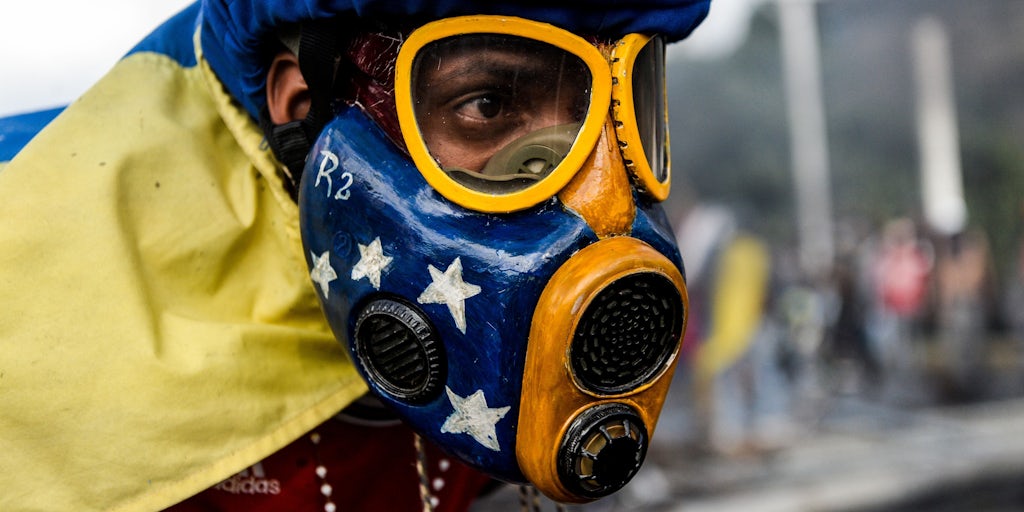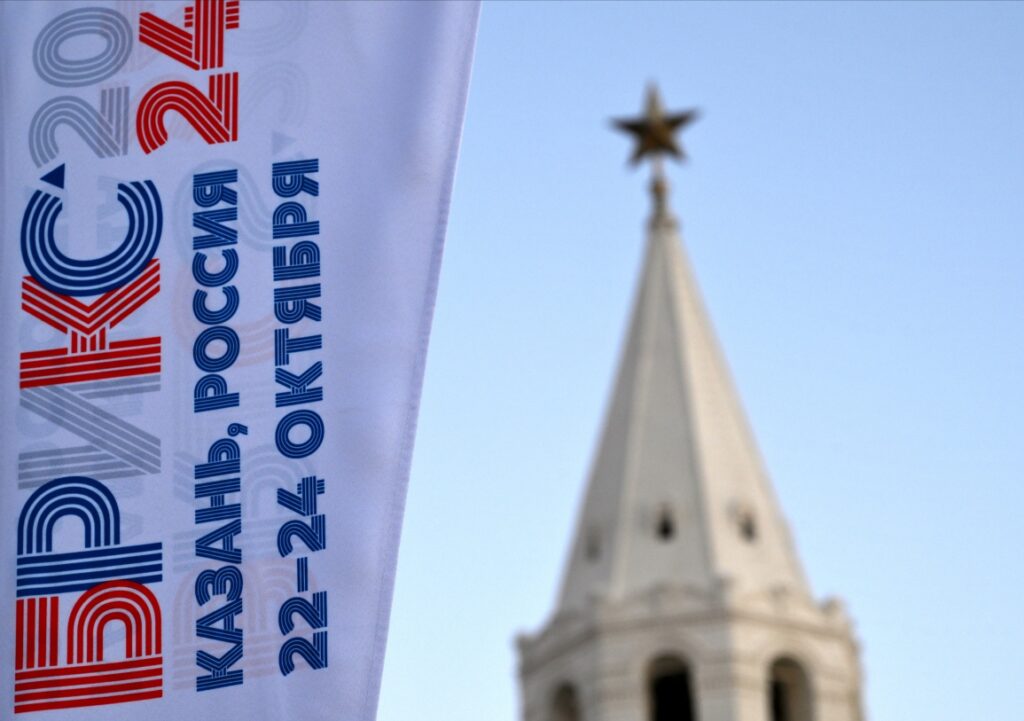How to Survive Chaos: Lessons from Venezuela | Intelligence, BoF Professional
CARACAS, Venezuela — The evening she was kidnapped, fashion designer Federika Padula was yanked out of her car by a group of men and thrown into the back of a vehicle with three other victims. “They were armed with military weapons, wore balaclavas, and were very well trained; they were policemen, I’m sure,” she recalls.
With her head shoved down and a gun pressed into her back, Padula couldn’t see what was happening around her, but she could hear the terrible sounds that lit her imagination with fear eight years ago: “I heard gunshots when they tried to abduct another victim and failed.”
Express kidnappings in Caracas, a city often ranked as the most violent capital in the world, are not only common practice, but also a profitable business for criminal gangs and the police who are accused by some of being complicit. Taking multiple victims in one night and keeping them in the car is an especially popular kidnapping technique known as ‘la cava’ which in English means putting the victims in ‘the cooler.’
“Everyone paid up,” says Padula. “In nine hours I reckon they made around $40,000 dollars.”
It’s one of the toughest moments Padula has had to endure since founding her namesake fashion brand in 2010. A single thought helped her remain calm during those frightening hours. “I understood that, for the kidnappers, kidnapping was a ‘business’ [so] somehow I knew I was going to be okay [even though] it was traumatic,” she recalls. “I’m just grateful nothing [worse] happened to me.”
I understood that, for the kidnappers, kidnapping was a ‘business.’
Padula knows that not every kidnapping attempt ends without bloodshed. In 2017, the 34-year old nephew of Venezuelan-born US designer Carolina Herrera, Reinaldo Herrera, and his associate, were killed during a similar kidnapping even though ransom was paid.
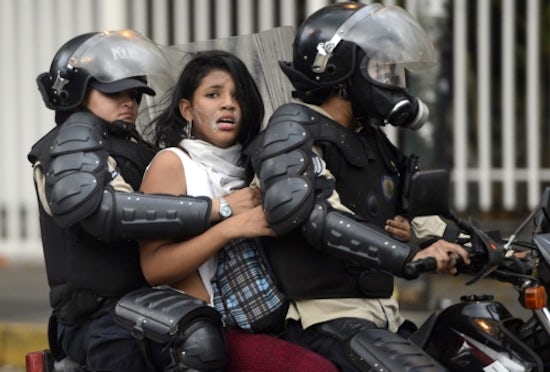
An anti-government activist is arrested by national police during a protest against
Venezuela President Nicolas Maduro in 2014 | Source: Leo Ramirez/Getty Images
Unfortunately, rampant crime is far from being Venezuela’s only problem. For at least a decade, the nation has been caught in a downward spiral with growing political unrest, a contracting economy — down by as much as 65 percent since 2013, according to the International Monetary Fund — and hyperinflation, not to mention food and gasoline shortages.
The chaotic environment makes Venezuela one of the most difficult places in the world to do business or find work and it has crippled once-thriving sectors of the economy like the country’s fashion industry.
Five million people have fled Venezuela since 2015, creating a refugee crisis that is one of the largest in modern history. According to the UN Refugee Agency, if the trend continues it could soon outpace the speed of displacement seen in Syria. For the fashion industry, this means shortages of staff and relocation of businesses abroad.
Adding to the ongoing turmoil, Venezuela is now facing over 94,000 Covid-19 cases and over 820 deaths reported at the time of publication. But unlike most countries, where worries are focused on the humanitarian and economic impact of the pandemic, in Venezuela it is far from the main issue on the minds of most.
Compared to the seemingly endless series of problems they’ve endured in recent years, this just feels like another crisis within a much longer-running catastrophe.
Facing overwhelming obstacles
Despite a raft of seemingly insurmountable challenges, some young entrepreneurs have managed to stay afloat. Accessory designer Vanessa Boulton explains how having a flexible structure, including moving her production in and out of Venezuela several times, has helped her business survive hyperinflation and an unstable economy over the years.
For example, in 2013 after the death of the former president Hugo Chávez, foreign currency was particularly difficult to access due to exchange controls and a sudden spike in dollar rates. Production costs were rising quickly, making Boulton’s accessories prohibitively expensive so she looked for ways to produce locally. Then, in the midst of violent protests in 2014, she switched back to external manufacturers once again.
Since establishing her namesake firm in 2005, Boulton became known for whimsical, colourful handbags, which are a reflection of her upbeat personality. But in recent years she’s pivoted from selling upmarket handbags to affordable everyday items like stationery, kid’s lunch boxes, and backpacks. “In a country with so many hurdles and frustrations we wanted people to be able to buy something without stressing about the price.”
Juan Carlos Ramos, founder of streetwear label Era, recounts how his production has been most affected by the inability to commute. “Public transport has been practically non-existent for several years. It’s difficult if you don’t own a car as most of the suppliers are in the centre [of Caracas],” he says, “the metro, in particular, is in extremely dire conditions and unsafe.”
This kind of neglect is true across most public infrastructure and decades of underinvestment have severely deteriorated the nation’s power grid. In March and July of 2019, designer Yenny Bastida was one of many to experience a week-long power cut which plunged the country into almost complete darkness.
“I was afraid of being here. I was scared of lootings,” says the designer who is based in the small city of Chivacoa. During those dark days unruly crowds sacked stores in cities across the country. Patients died in hospitals and food rotted away while many starved.
I was afraid of being here. I was scared of lootings.
After the episode, Bastida shelled out for a power generator which she installed in her workshop, but now a severe gasoline shortage has affected that too. “It runs on diesel, and now even that’s hard to find,” she explains. “The country is about to come to a complete halt.”
Despite having the largest oil reserves in the world, Venezuela has begun to feel the effects of years of mismanagement and corruption. The fuel shortages are not new, but analysts say the current crisis is unprecedented. Venezuela’s already-decaying oil sector has experienced plummeting prices and its lowest production since the 1940s. Add to this US sanctions and a shrinking global demand for oil that has been exacerbated by the global economic slowdown caused by the pandemic.
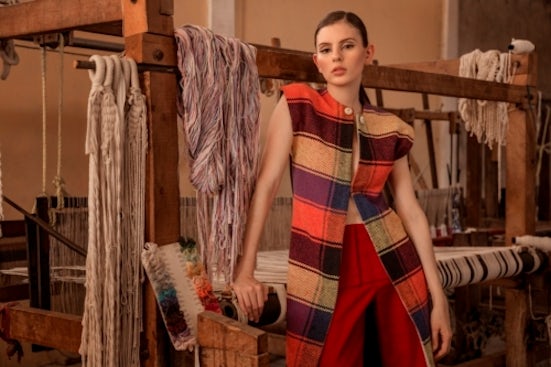
Yenny Bastida’s 2019 Tintorera collection | Source: Courtesy
Refusing to let anything stop her business, Bastida has resorted to bicycles to help her staff get around, but some of her production employees who work from home and live further away haven’t been able to receive fabric in months.
Daniela Panaro, founder of the brand No Pise La Grama, bemoans the unpredictability. “Every day there’s a new challenge. At one point it was a shortage of materials. After that, the main problem was finding food for our staff; you had to queue for hours, even if you had the money it was difficult to get it. Then came the electrical crisis. We’ve had to make drastic decisions in order to continue to grow and sell internationally,” she explains.
Riding the current wave of uncertainty is something many Venezuelan designers have already become accustomed to. “Now that coronavirus hit, everyone is talking about reinvention,” says Boulton. “We’ve been doing that for years and there are a lot of people now who keep working as if they are oblivious to what’s going on — we’re one of them,” she says with a hint of guilt, and then continues, “you have to keep moving, if you stop to think you get consumed by the chaos.”
You have to keep moving, if you stop to think you get consumed by the chaos.
Maracay-based designer Efrain Mogollon has also managed to adapt to business in Venezuela. He’s had to close his workshop during protests and order fabrics up to three months in advance to factor in the lengthy customs and compliance procedures. “In [neighbouring] Colombia you can get fabric in two weeks; here it is up to three months,” he explains.
But since his Portuguese and Italian fabric providers were shut during Europe’s lockdown, he had to cancel many of his valuable client orders and miss a major opportunity with a global e-tailer.
A land of stark contrasts
It’s only natural to think that a country submerged in such a deep crisis would experience an irreparable decline in fashion consumption. With so many other things to worry about, surely fashion would be the last thing on people’s minds. But journalist and stylist Jorge Malave, who lives between Bogotá, Colombia and Caracas, Venezuela argues the contrary.
“What’s most surprising is that brands continue to sell [in Venezuela as people are still] invest[ing] in clothing, makeup and how they look,” he says, referring to products with price points that are affordable for the middle and upper classes. However, even working-class consumers who earn nothing more than the wretchedly low minimum wage find ways to shop at discount stores like Traki, which sells everything from stationery and homeware to clothes and food.
“Even when the country is beaten up, there’s still a lot of opportunity,” says Caracas-based designer Nabel Martins who sells in Spain, the US, Panama and Colombia. “Venezuela is still a captivating market,” she says, confirming most of her clientele is there.
Even when the country is beaten up, there’s still a lot of opportunity.
Malave believes that the stark contrast between market demand and a plummeting economy was largely prompted by the dollarisation of the economy that began in 2018. That year, Venezuela’s hyperinflation crisis was one of the worst seen in modern history, standing at over 1 million percent according to Caracas-based research firm Ecoanalitica.
As a result, the government eased exchange controls and allowed private banks to sell foreign currency for the first time in decades. Ecoanalitica Director Asdrubal Oliveros explains for some categories, including clothing and accessories, “more than 90 percent of transactions are being carried out in dollars.”
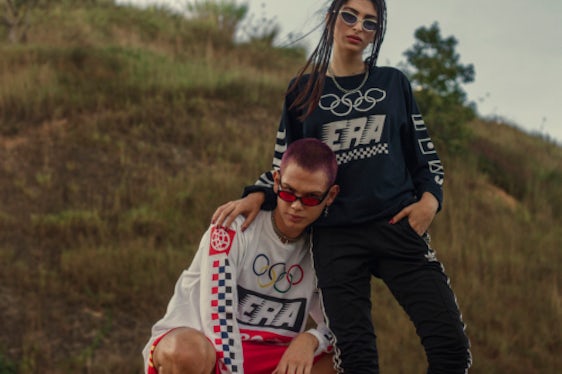
A campaign image for Era by Juan Carlos Ramos | Source: Courtesy
“There’s now a sub-economy within the economy,” says Carolina Goicochea, founder and director of GPC consulting, a Caracas-based public relations firm. She explains that for some people in precarious circumstances “life has completely changed” now that they have access to dollars acquired thanks to side hustles, gigs or collecting tips for doing deliveries, for example.
Martins agrees that “coming clean” with the dollar exchange did motivate some people to purchase again, but she adds, “They’re doing it in a more conscious manner.”
The transition also helped Martins launch a new line of sustainable, affordable basics which she runs with an associate from across the border in Bogotá, Nicolas Castillo Ruan. The brand, called Verticales, has enjoyed success since its launch last year. “Many tend to underestimate local brands, [but pricing in dollars] helps people realise your product is capable of competing in the international market in both quality and price.”
Bewildering demand for luxury
Affordable products are one thing, but a growing market for imported luxury goods has baffled many at a time when local fashion industry workers are in desperate need of support.
Last year a lavish concept store, Maison 11, opened in one of the most exclusive areas of Caracas, boasting everything from top local designers like Panaro’s No Pise La Grama to international brands like Lanvin and an in-house gourmet restaurant.
“The idea of having a luxury store in Venezuela sounded risky,” says Alice Gabaldon, one of its co-owners, noting there were already luxury stores like Carolina Herrera and multi-brand boutique Casablanca, which is an outlet for brands like Versace and Roberto Cavalli.
In a country which was ranked by the World Bank as one of the worst in the world to do business — taking the 188th spot out of 190 to be exact — Gabaldon minimised her risk by lowering her initial investment.
“We started out by placing local brands on consignment and testing out international brands.” By “testing” she means they acquired designer merchandise from outlet sales or overstock channels before making formal wholesale orders.
Many have raised an eyebrow over Gabaldon for pursuing what they deem to be a decadent and ambitious business during such trying times. But like other entrepreneurs she believes it is a way of helping the country survive its current decline.
Someone will always criticise you no matter what you do. I chose to build my life here and I wasn’t going to sit with my arms crossed.
“Someone will always criticise you no matter what you do. I chose to build my life here and I wasn’t going to sit with my arms crossed. At least I am contributing something. People are grateful to have a place to go out and shop. I’m betting on my country,” Gabaldon says.
Nevertheless, according to Goicochea, Venezuela has become a land of stark contrasts. “We don’t have gasoline, but you can find dates, figs and Persian rugs” for a small percentage of the population that “boasts vast sums of money” and is hungry for luxury despite the poverty around them. “We’ve become a country of black and white,” she says.
Part of this wealth comes from old money held by the few families still in existence that helped build the industrial foundations of the Venezuelan economy over generations. But there is also a new class of entrepreneurs emerging who are known as the enchufados, a term coined by those opposed to the Venezuelan government which roughly translates to “plugged-in elites.”
As Venezuelan economist Juan Cristobal Nagel explains, it refers to “the various cronies and other groups aligned with the government that are profiting from Venezuela’s massive economic distortions.”
According to Nagel, the military are a “key” part of this group but it is a “heterogeneous bunch” composed of many individuals, from business people to public employees. Some “foreign investors, large multinationals, and even foreign countries qualify,” adds Nagel.
This is why London-based, Venezuelan journalist Alek Boyd remains sceptical of sudden and recent business successes in a country with an economy as impoverished as Venezuela’s.
“The boliburgueses (a new bourgeois class who amassed great wealth under Chávez’s regime and current president Nicolás Maduro’s administration with alleged the complicity of public officials) are the only ones with enough cash to burn… in a country without any favourable economic prospects.”
According to the 2019 Corruption Perception Index issued by Transparency International, Venezuela ranked as the most corrupt country in the Western Hemisphere and fifth in the world.
The era of “Chavismo” (marked by Chávez’s and Maduro’s presidencies) has seen corruption reach unprecedented levels, according to a report by Transparency Venezuela contending that billions of dollars of public funds have been sent abroad, and more than 20 countries have opened judicial investigations into the alleged embezzlement of Venezuelan funds.
Maduro was re-elected president in 2018 in a vote marred by an opposition boycott and claims of vote-rigging. This prompted National Assembly leader Juan Guaidó to declare himself interim president of Venezuela. Guaidó’s mentor, opposition leader Leopoldo López, who was under house arrest at the time of the election and is now exiled in Spain, reportedly helped him orchestrate the move and Guaidó is now considered the legitimate leader by more than 50 countries, including the United States. However, Maduro still remains in power backed by the military.
The political situation became even more precarious last March when the US State Department offered a $15 million reward for information leading to the capture of Maduro and charged 15 current and former officials linked to his regime with drug trafficking, narco-terrorism, corruption and money laundering.
Hope at home and in exile
“I go through Caracas and I see the ghosts of what was,” says Boulton. “But I also think of what it could become again. I haven’t let go of that dream. Venezuela has been reduced to the minimum and I continue to sell out [all of my collections]. I can’t leave a country where I haven’t reached my full potential. There is still lots of opportunity.”
I go through Caracas and I see the ghosts of what was. But I also think of what it could become again.
Sometimes it’s hard to believe that not too long ago Venezuela boasted a thriving and globally connected local luxury industry with stores like Louis Vuitton, Loewe and cult multi-brand boutiques like Minouche stocking many upscale designers.
The Venezuelan market once had such cachet in the Latin American region — and indeed the wider global fashion industry — that Christian Dior chose Caracas as one of the first locations for his boutique outside of Paris back in the 1950s.
“In the 80s you had an intellectual class that spoke two languages, was cosmopolitan, cultivated with a passion for design and art [so fashion wasn’t just about shopping],” says Miami-based Lise Drouilly, founder of the PR firm Pearl Events which represented Venezuelan designers like Oscar Carvallo and Roberi Parra. “Gradually, with the exodus, this class began to disappear,” she recalls.
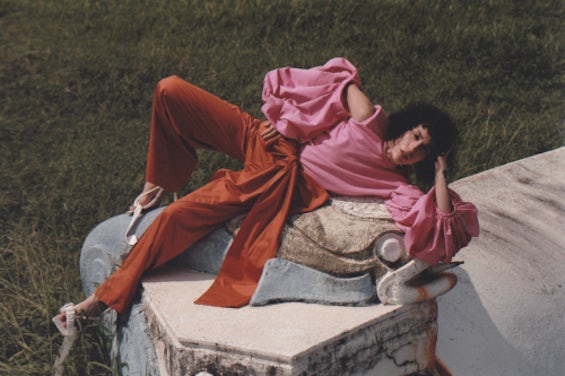
Efrain Mogollon Spring/Summer 2021 collection | Source: Courtesy
But before the country’s heyday ended, Venezuelan entrepreneur and investor Carmen Busquets opened her store Cabus Caracas with great success in the 90s, selling brands like Chanel, Thierry Mugler and Alaïa.
“Back in the day the only references to fashion [designers from] Venezuela were Carolina Herrera or Angel Sanchez, but in the mid-2000s a series of designers began to emerge,” says journalist and former fashion editor of Hola Venezuela Gianfranco Berardinelli citing names like Roberi Parra, Laili Lau, Daniela Panaro and Maria Fernanda Pulgar. He recounts stores like Aprilis, Corot, Slabon and Iskia, among others, that served as important spaces to promote local design. “It was an exciting time for Venezuelan fashion.”
Fabiana Pigna, who established her namesake label in Los Angeles in 2015, admires those who have built a business in Venezuela in spite of its exceptional challenges. “I think it’s amazing those designers who have their ateliers there and have taught people to make clothes the way they like,” she says, adding, “I don’t see the possibility of producing in Venezuela [myself but] when things get better, I’d love to sell there.”
Bastida, for example, has produced all of her collections in her Chivacoa workshop since she started her brand in 2003. It’s a team she’s worked hard to put together over the years. “Many have left because of the crisis, but some of them have been with us since the beginning.”
However, for other designers, starting from scratch in a new country outweighed the risks of staying. Take Roberi Parra and Laili Lau, for example. The former had a well-established firm in Caracas for over 10 years but after the third time his atelier was robbed he left for New York, where he emerged as a finalist in season 15 of Project Runway. Though he wasn’t able to stay in business for long after that, it’s a dream he hasn’t abandoned.
Lau also managed to relocate her business to the US and built a stable life from her base in Brooklyn, where she’s lived since 2017. Like many Venezuelan émigrés, she still has strong ties to her homeland and says she would return there if “the conditions allowed it.”
“There is still lots to do here in Venezuela,” says Padula, who once tried her luck abroad after her kidnapping but was unable to adapt. Despite later having her atelier robbed and her entire collection stolen on another occasion when the country was going through a particularly intense period of upheaval, she seems as rooted in her homeland. Instead of feeling beaten down by the seemingly endless hurdles that she faces or envious of her peers abroad who would find her experiences impossible to fathom, Padula tries to see silver linings wherever she can — both in life and in business.
“New business opportunities have actually surged because of what has been abandoned,” she says, explaining that her attachment to Venezuela is not just about staying close to her roots and family. “If we all go, who are we going to leave this to?”
Related Articles:
Luxury Brands Face Uncertain Future in Latin America
Online Battle Heats Up in Latin America
Latin America’s $160 Billion Fashion Opportunity

